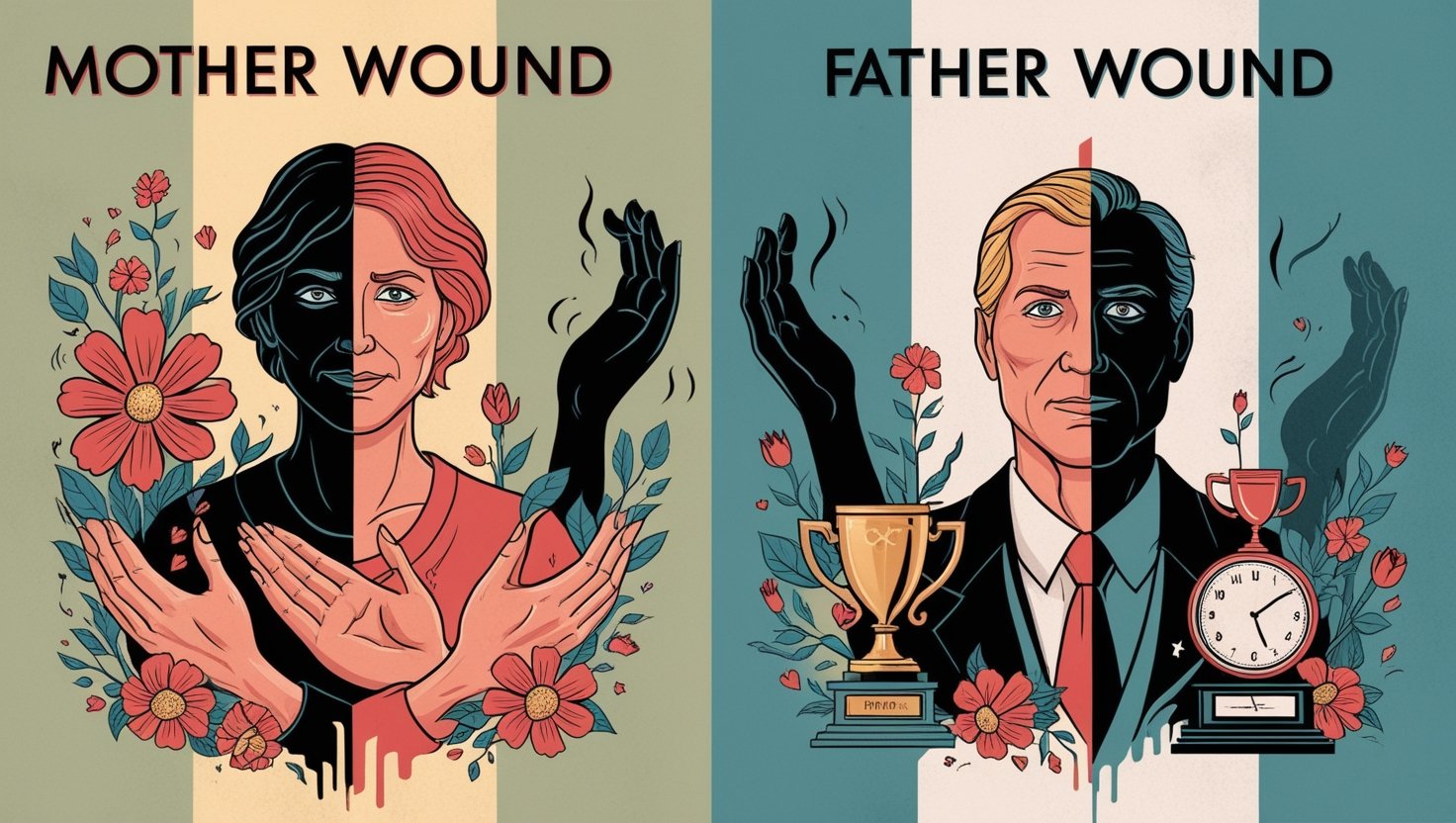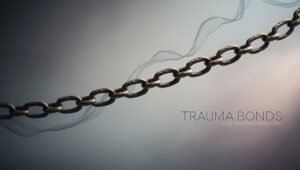Parenting shapes who we are, whether we acknowledge it or not. Two critical concepts in psychology are the Mother Wound and the Father Wound, which represent deep emotional injuries stemming from unresolved dynamics with one’s parents. These wounds often influence our behaviors, relationships, and overall well-being in ways we might not be consciously aware of.
What Are the Mother Wound and Father Wound?
The Mother Wound and Father Wound refer to emotional injuries that arise from negative or toxic experiences with one’s parents. These emotional wounds are not necessarily the result of intentional harm; they can be the byproduct of a parent’s unhealed trauma, societal pressures, or their own limitations. Understanding these wounds is crucial in fostering personal growth and healthier relationships.
The Origins of These Wounds
Historical and Cultural Context
In many societies, traditional gender roles have shaped the parenting dynamic. Mothers were expected to be nurturing caregivers, while fathers were often seen as providers and disciplinarians. These societal pressures not only placed unrealistic expectations on parents but also contributed to the emotional wounds that can be passed down through generations.
Family Dynamics and Generational Trauma
Generational trauma refers to the emotional pain and behavioral patterns passed down from one generation to the next. This trauma can be deeply rooted in a family’s history, as unresolved issues from one’s parents or grandparents trickle down and influence how they parent their children.
The Impact of Parental Wounds on Personal Development
Emotional and Psychological Effects
Parental wounds can lead to feelings of insecurity, unworthiness, and emotional disconnection. A child who grows up feeling unloved or unimportant may carry these emotional scars into adulthood, affecting their ability to form close relationships.
Behavioral Patterns and Relationship Challenges
People with unresolved parental wounds may struggle with trust, intimacy, or authority. They may develop maladaptive behaviors like people-pleasing, avoidance, or aggression as coping mechanisms.
Understanding the Mother Wound
Defining the Mother Wound
The Mother Wound represents the emotional and psychological pain a child experiences due to a complicated or strained relationship with their mother. It may involve feelings of rejection, abandonment, or being overprotected.
Common Signs of the Mother Wound
Emotional Disconnection
If you had a mother who was emotionally unavailable or critical, you might struggle to form deep, meaningful relationships. Emotional disconnection can lead to challenges in expressing vulnerability or asking for support.
Overcompensation or Lack of Self-Worth
Children of mothers who were overly critical or neglectful may feel unworthy or constantly seek validation from others. This often leads to overcompensation in various aspects of life, from work to personal relationships.
The Influence of Gender Roles in the Mother Wound
The Role of Societal Expectations
Mothers are often idealized as selfless caregivers, expected to meet impossible standards. When they fall short, children may internalize these failures, believing they are somehow unworthy or unlovable.
Motherhood Pressures and Expectations
The pressure to conform to societal expectations of being the “perfect mother” can prevent mothers from being emotionally available to their children, inadvertently creating wounds that last a lifetime.
Understanding the Father Wound
Defining the Father Wound
The Father Wound refers to the emotional pain caused by a strained or absent relationship with one’s father. It can manifest as a fear of failure, authority issues, or a lack of confidence.
Common Signs of the Father Wound
Struggles with Authority Figures
If your father was controlling or overly strict, you might develop an inherent distrust of authority figures, rebelling against them or fearing judgment.
Fear of Failure and Lack of Confidence
Many people with a Father Wound struggle with self-confidence, often fearing failure or judgment. This can manifest as procrastination, perfectionism, or an unwillingness to take risks.
The Influence of Traditional Masculinity on the Father Wound
Cultural Expectations for Fathers
Historically, fathers were expected to be the stoic providers, suppressing their emotions and focusing solely on material provision. This emotional unavailability creates a gap in a child’s emotional development, leading to feelings of abandonment.
The Suppression of Emotions in Men
Fathers who were taught to suppress emotions may pass this pattern onto their children, leading to an emotionally distant relationship that leaves wounds well into adulthood.
The Interplay Between the Mother Wound and Father Wound
How These Wounds Coexist
These wounds can exist simultaneously, influencing each other and creating a complex web of emotional pain. For instance, if both parents were emotionally unavailable, a child may struggle with feelings of isolation and unworthiness.
Combined Effects on Relationships and Self-Perception
The interplay of both wounds can deeply impact how we perceive ourselves and how we relate to others. It often leads to challenges in forming secure attachments and may result in patterns of unhealthy relationships.
Healing the Mother Wound
Steps to Identify and Acknowledge the Mother Wound
Healing starts with awareness. Identifying patterns of emotional pain and understanding their root causes is the first step toward healing.
Practical Strategies for Healing
Therapy and Counseling
Speaking with a professional therapist can help unravel deep-seated emotional wounds. Therapy offers tools to process feelings of abandonment, rejection, or unworthiness.
Inner Child Work
This therapeutic approach involves connecting with and nurturing the younger, wounded parts of yourself. Inner child work allows you to reparent yourself with the love and care you may have missed.
Healing the Father Wound
Recognizing the Father Wound in Your Life
To heal, you must first recognize how the Father Wound has shaped your identity, behaviors, and relationships.
Tools and Techniques for Healing
Rebuilding Trust and Security
Establishing trust with yourself and others is a key step. This involves practicing self-compassion, setting boundaries, and forming healthy, secure attachments.
Emotional Release and Expression
Releasing pent-up emotions through journaling, talking with a trusted friend, or engaging in creative outlets can help break the cycle of emotional suppression.
Breaking the Cycle of Generational Trauma
Understanding Generational Healing
Healing your wounds not only benefits you but also paves the way for future generations. Understanding and addressing generational trauma allows you to break the cycle, providing a healthier emotional environment for your children.
How to Pass on Healthier Patterns to the Next Generation
Modeling emotional awareness, open communication, and vulnerability can foster a nurturing atmosphere for children. Encourage them to express their feelings and validate their experiences, which helps cultivate resilience and emotional intelligence.
1. Low Self-Esteem
Daughters with a father wound often struggle with feelings of worthlessness. They may internalize negative messages from their father or the lack of attention, leading to a persistent belief that they are not good enough.
2. Relationship Challenges
These daughters may find it difficult to form and maintain healthy relationships, particularly with men. They might either seek out partners who replicate their father’s behavior or avoid intimacy altogether, fearing vulnerability.
3. Fear of Abandonment
A deep-seated fear of being left or rejected can manifest, leading to anxiety in relationships. This fear can cause them to push others away or cling excessively to avoid being abandoned.
4. People-Pleasing
Many daughters may develop a strong need to gain approval from others, often prioritizing others’ needs over their own. This can lead to burnout and resentment, as they neglect their own desires and feelings.
5. Trust Issues
Having faced disappointment or neglect from their father, these daughters often struggle to trust others. This can make it hard for them to open up and form deep connections.
6. Emotional Disconnect
Daughters may have trouble expressing their emotions or connecting with others on a deeper level. They might appear stoic or detached, struggling to engage with their feelings fully.
7. Perfectionism
A strong need to be perfect can arise from a desire to gain approval and avoid criticism. This can lead to an overwhelming sense of pressure, where mistakes are viewed as failures rather than opportunities for growth.
8. Struggles with Intimacy
Many daughters with a father wound fear intimacy and vulnerability. They might find themselves distancing from partners or sabotaging relationships due to fear of getting hurt.
9. Rebellion
In response to their father’s absence or emotional unavailability, some daughters may rebel against authority figures, expressing their anger and frustration in unhealthy ways.
10. Comparative Self-Image
Constantly comparing themselves to others can lead to feelings of inadequacy. Daughters may feel they fall short compared to peers, leading to a cycle of self-doubt and negative self-talk.
Understanding these symptoms is crucial for healing and growth. Recognizing the impact of the father wound can help daughters seek support and develop healthier relationships with themselves and others. If you or someone you know resonates with these symptoms, consider exploring therapeutic avenues to address these challenges.
1. Low Self-Esteem
Sons may struggle with feelings of inadequacy and worthlessness, often feeling that they can’t measure up to expectations set by their fathers or society.
2. Difficulty with Authority
They might have a contentious relationship with authority figures, rebelling against rules or feeling mistrustful of those in power.
3. Emotional Suppression
Many sons learn to suppress their emotions, believing that vulnerability is a weakness. This can lead to difficulty expressing feelings and connecting with others.
4. Fear of Intimacy
A fear of getting close to others can emerge, making it challenging to form meaningful relationships, especially romantic ones.
5. People-Pleasing
In an effort to gain approval, sons may go out of their way to please others, often at the expense of their own needs and desires.
6. Competitive Behavior
They may feel an intense need to prove themselves, leading to overly competitive tendencies, often viewing relationships as contests.
7. Anger and Resentment
Feelings of anger towards their fathers can manifest as resentment, affecting their relationships with other male figures or authority figures.
8. Avoidance of Commitment
Some sons may struggle with commitment in relationships, fearing vulnerability and the potential for rejection.
9. Struggles with Masculinity
They may grapple with their identity and what it means to be masculine, often feeling pressure to conform to societal standards.
10. Emotional Withdrawal
A tendency to withdraw emotionally from situations or relationships can arise, making it difficult to connect deeply with others.











